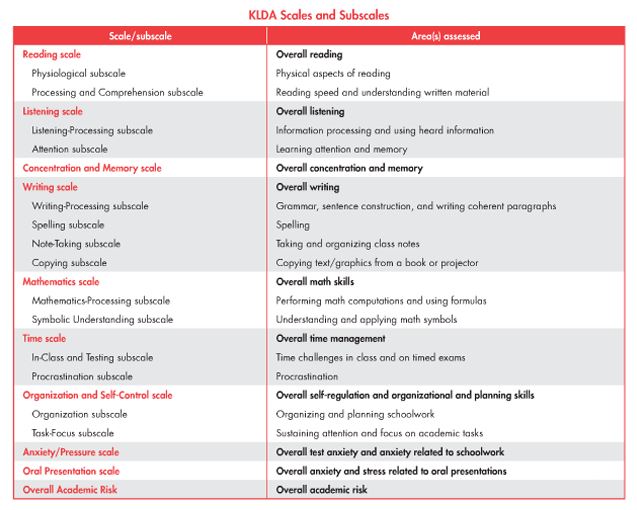Screens college students for learning difficulties
Steven T. Kane, PhD; Professional Manual by Steven T. Kane, PhD, and Heddy Kovach Clark, PhD
Valid and Reliable Screening Test to Identify Academic Strengths, Weaknesses, and Potential Learning Difficulties
The KLDA is a self-report rating form that quickly screens college students and measures academic strengths and weaknesses in key areas, including reading, writing, listening, math and more.
Now with an updated e-manual that includes a new case study and supporting information on best practices to encourage students to answer truthfully and accurately.
Features and benefits
- Measures a student’s academic strengths and weaknesses in key areas, including reading, writing, math, listening, concentration, memory, organization, time management, oral presentation, self-control, pressure, and anxiety.
- Can be incorporated into university-based student success and retention programs.
- Provides students with a comparative sense of their academic skills in relation to their peers using means, standard deviations, and percentile scores.
- Helps identify students at risk for learning disabilities and attention-deficit disorders who may need further assessment.
- Helps identify other issues that may affect learning, such as anxiety, memory, or functional problems like organization and procrastination.
- Suggests recommendations for interventions and accommodations for each scale and subscale weakness.
Who Administers the KLDA?
As no special qualifications are needed to administer and interpret the KLDA, it is used in a wide variety of settings.
- Academic and mental health professionals working with students in community colleges, 4-year colleges, universities, and graduate schools to identify students with learning difficulties and recommend interventions.
- Academic advisors, counselors, and tutors working in college and university advising, counseling, and disability resource centers.
- Advisors and teachers working in community colleges, as these institutions typically serve larger populations of academically at-risk students.
- Teachers, advisors, and counselors who work in First Year Experience (FYE) programs as a screener to identify students in need of academic support services.
- Independent practitioners, such as psychologists and learning disability specialists, as a screening tool and as part of the diagnostic process.
